Information Technology Ethics: Net Neutrality and Security Concerns
VerifiedAdded on 2020/04/07
|10
|1690
|89
Report
AI Summary
This report delves into the ethical considerations surrounding Information Technology (IT), specifically focusing on net neutrality and the security challenges it presents. The report begins with an introduction to Information and Communication Technology (ICT), highlighting its benefits and ethical concerns, particularly security. It then discusses the EU's commitment to net neutrality, outlining its rules and regulations for an open internet. The core of the report analyzes the ethical implications of net neutrality, particularly the security risks, through the lens of classical ethical theories such as utilitarianism, deontology, virtue, and contract theory. The report concludes by proposing solutions to mitigate security issues, including the roles of National Regulatory Authorities (NRAs) and BEREC in monitoring and maintaining security. Overall, the report provides a comprehensive analysis of the ethical dimensions of net neutrality and its implications for IT users in the EU.
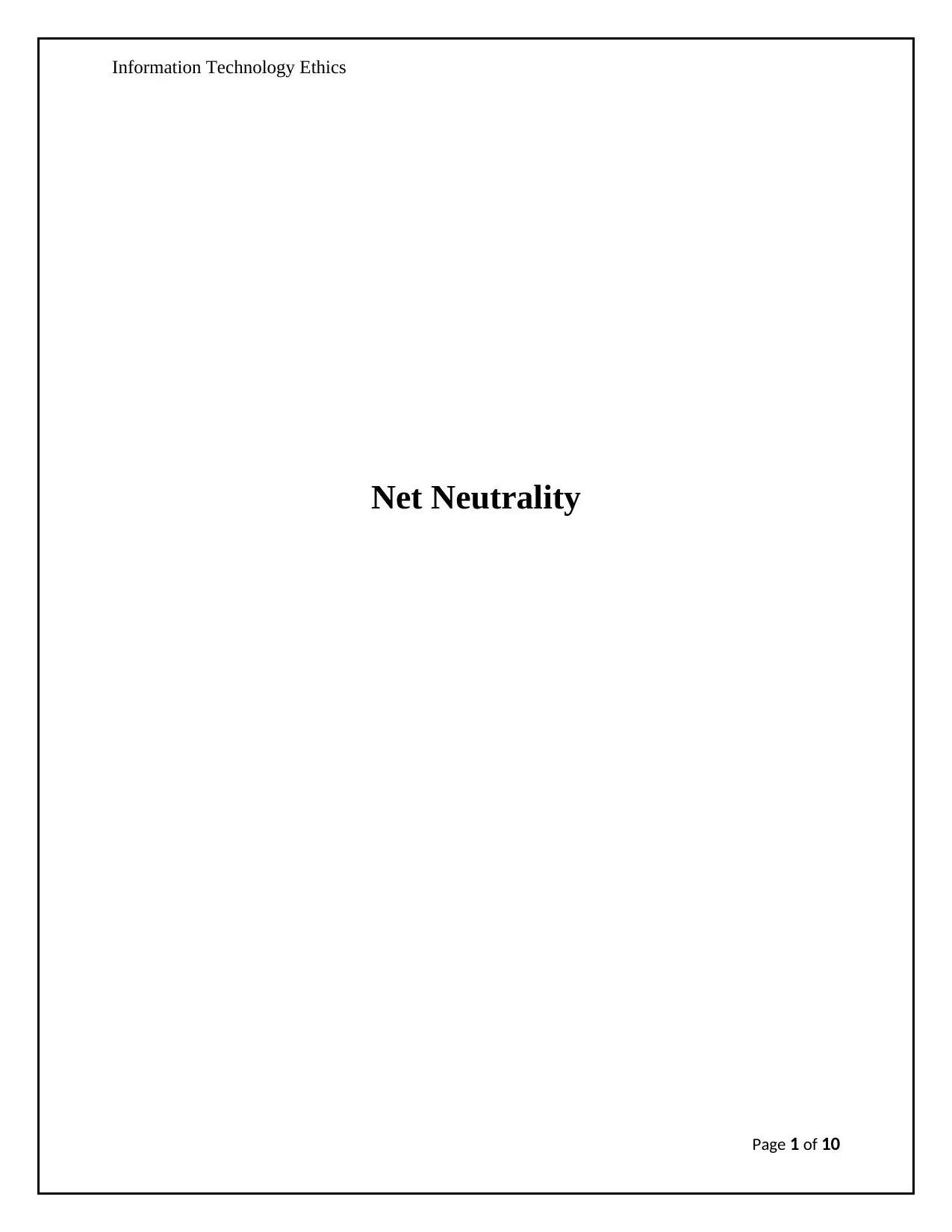
Information Technology Ethics
Net Neutrality
Page 1 of 10
Net Neutrality
Page 1 of 10
Paraphrase This Document
Need a fresh take? Get an instant paraphrase of this document with our AI Paraphraser
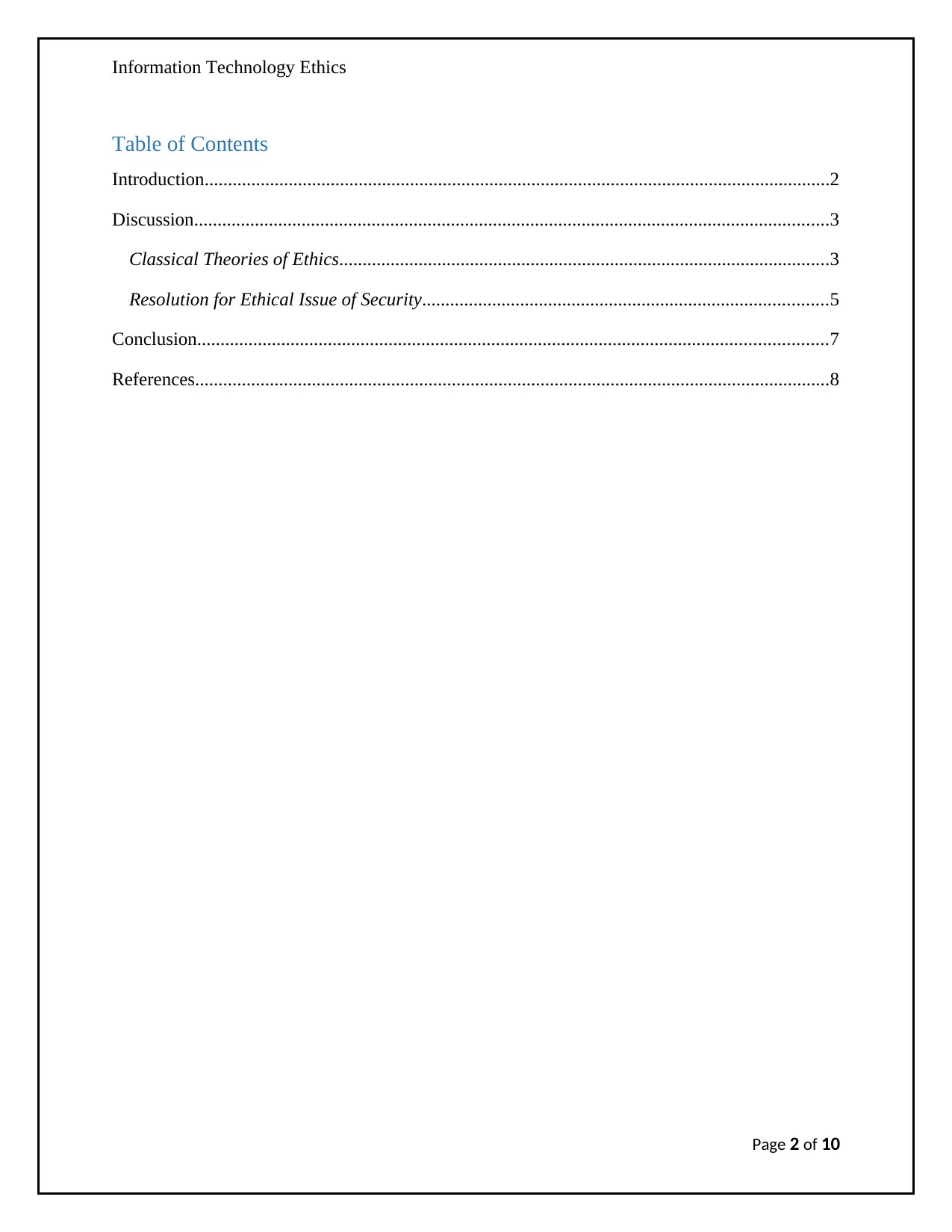
Information Technology Ethics
Table of Contents
Introduction......................................................................................................................................2
Discussion........................................................................................................................................3
Classical Theories of Ethics.........................................................................................................3
Resolution for Ethical Issue of Security.......................................................................................5
Conclusion.......................................................................................................................................7
References........................................................................................................................................8
Page 2 of 10
Table of Contents
Introduction......................................................................................................................................2
Discussion........................................................................................................................................3
Classical Theories of Ethics.........................................................................................................3
Resolution for Ethical Issue of Security.......................................................................................5
Conclusion.......................................................................................................................................7
References........................................................................................................................................8
Page 2 of 10
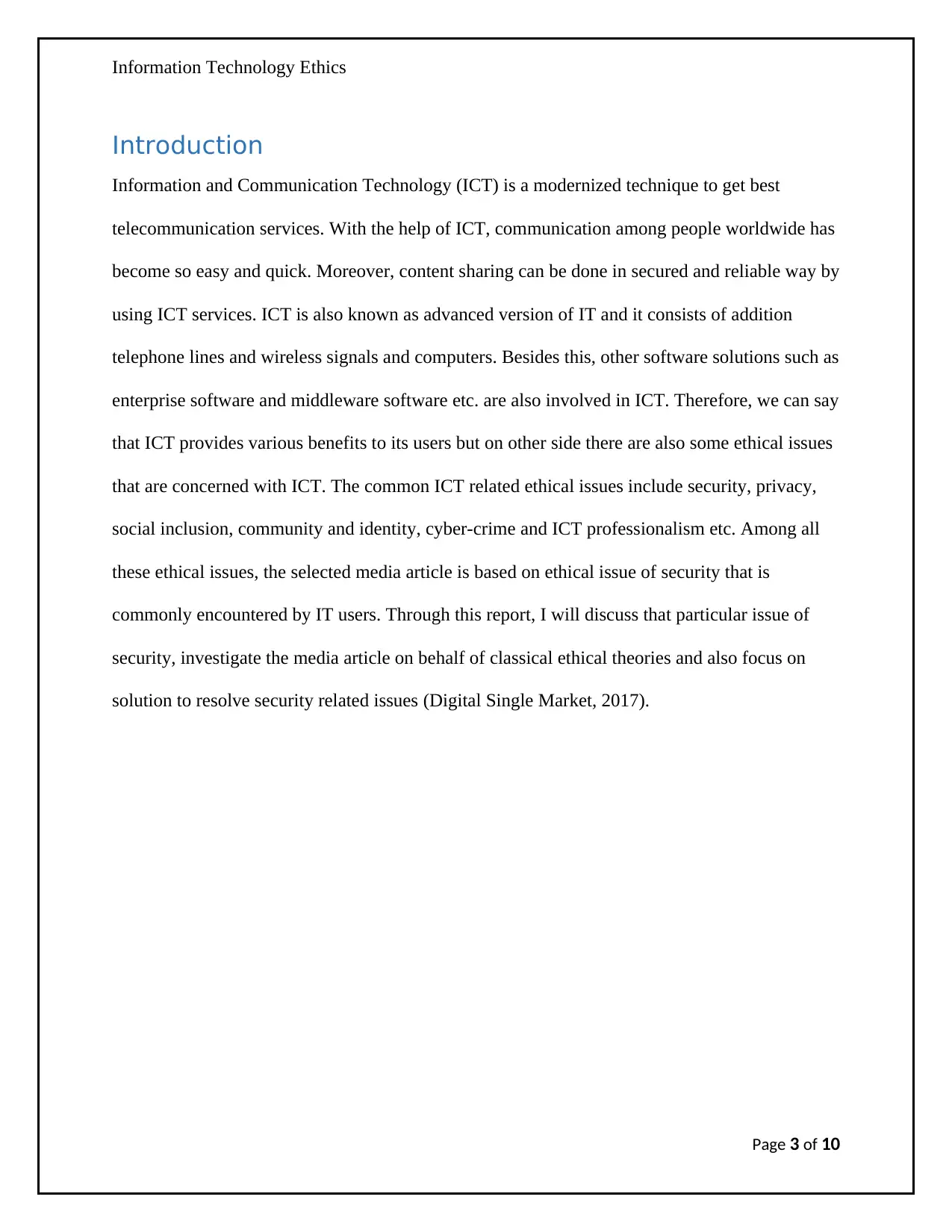
Information Technology Ethics
Introduction
Information and Communication Technology (ICT) is a modernized technique to get best
telecommunication services. With the help of ICT, communication among people worldwide has
become so easy and quick. Moreover, content sharing can be done in secured and reliable way by
using ICT services. ICT is also known as advanced version of IT and it consists of addition
telephone lines and wireless signals and computers. Besides this, other software solutions such as
enterprise software and middleware software etc. are also involved in ICT. Therefore, we can say
that ICT provides various benefits to its users but on other side there are also some ethical issues
that are concerned with ICT. The common ICT related ethical issues include security, privacy,
social inclusion, community and identity, cyber-crime and ICT professionalism etc. Among all
these ethical issues, the selected media article is based on ethical issue of security that is
commonly encountered by IT users. Through this report, I will discuss that particular issue of
security, investigate the media article on behalf of classical ethical theories and also focus on
solution to resolve security related issues (Digital Single Market, 2017).
Page 3 of 10
Introduction
Information and Communication Technology (ICT) is a modernized technique to get best
telecommunication services. With the help of ICT, communication among people worldwide has
become so easy and quick. Moreover, content sharing can be done in secured and reliable way by
using ICT services. ICT is also known as advanced version of IT and it consists of addition
telephone lines and wireless signals and computers. Besides this, other software solutions such as
enterprise software and middleware software etc. are also involved in ICT. Therefore, we can say
that ICT provides various benefits to its users but on other side there are also some ethical issues
that are concerned with ICT. The common ICT related ethical issues include security, privacy,
social inclusion, community and identity, cyber-crime and ICT professionalism etc. Among all
these ethical issues, the selected media article is based on ethical issue of security that is
commonly encountered by IT users. Through this report, I will discuss that particular issue of
security, investigate the media article on behalf of classical ethical theories and also focus on
solution to resolve security related issues (Digital Single Market, 2017).
Page 3 of 10
⊘ This is a preview!⊘
Do you want full access?
Subscribe today to unlock all pages.

Trusted by 1+ million students worldwide
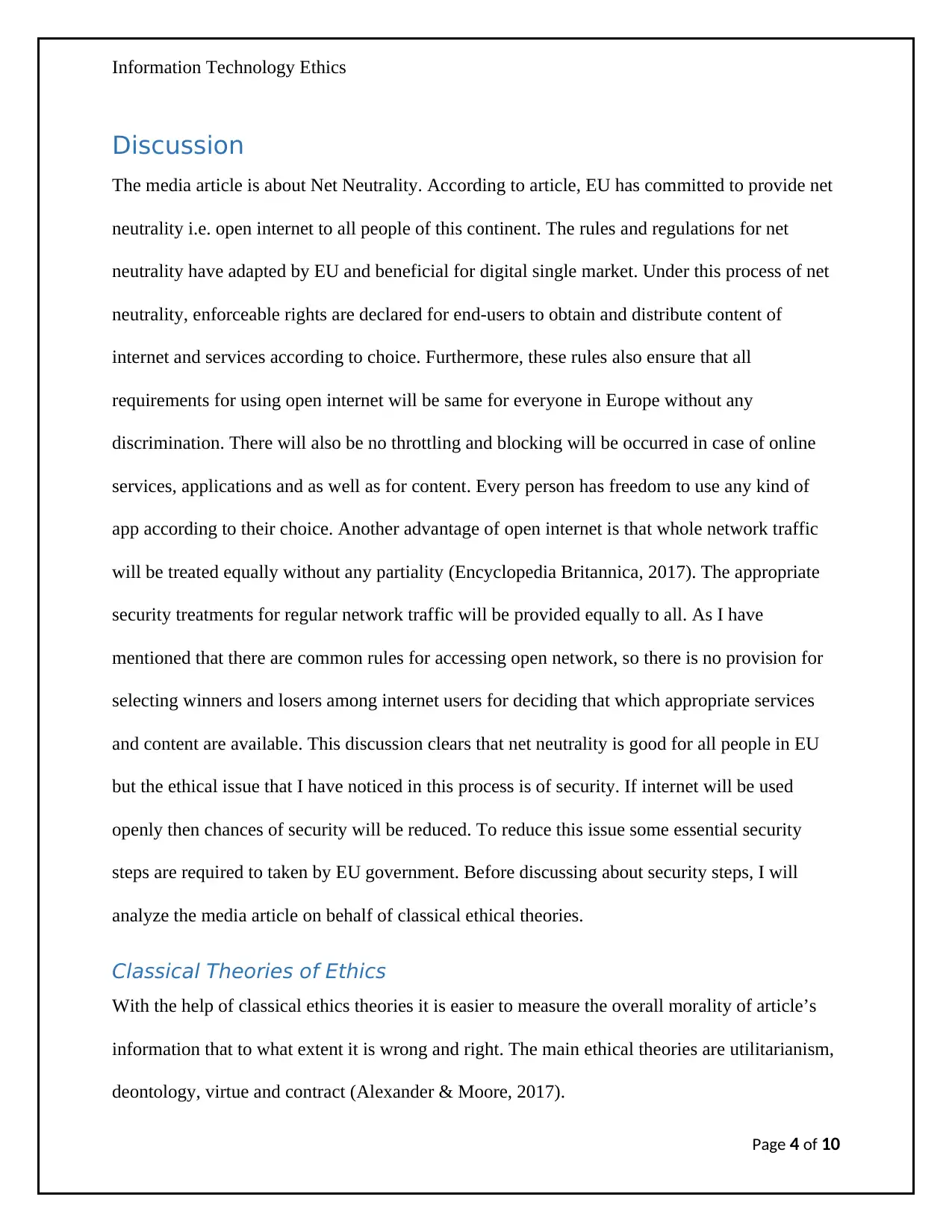
Information Technology Ethics
Discussion
The media article is about Net Neutrality. According to article, EU has committed to provide net
neutrality i.e. open internet to all people of this continent. The rules and regulations for net
neutrality have adapted by EU and beneficial for digital single market. Under this process of net
neutrality, enforceable rights are declared for end-users to obtain and distribute content of
internet and services according to choice. Furthermore, these rules also ensure that all
requirements for using open internet will be same for everyone in Europe without any
discrimination. There will also be no throttling and blocking will be occurred in case of online
services, applications and as well as for content. Every person has freedom to use any kind of
app according to their choice. Another advantage of open internet is that whole network traffic
will be treated equally without any partiality (Encyclopedia Britannica, 2017). The appropriate
security treatments for regular network traffic will be provided equally to all. As I have
mentioned that there are common rules for accessing open network, so there is no provision for
selecting winners and losers among internet users for deciding that which appropriate services
and content are available. This discussion clears that net neutrality is good for all people in EU
but the ethical issue that I have noticed in this process is of security. If internet will be used
openly then chances of security will be reduced. To reduce this issue some essential security
steps are required to taken by EU government. Before discussing about security steps, I will
analyze the media article on behalf of classical ethical theories.
Classical Theories of Ethics
With the help of classical ethics theories it is easier to measure the overall morality of article’s
information that to what extent it is wrong and right. The main ethical theories are utilitarianism,
deontology, virtue and contract (Alexander & Moore, 2017).
Page 4 of 10
Discussion
The media article is about Net Neutrality. According to article, EU has committed to provide net
neutrality i.e. open internet to all people of this continent. The rules and regulations for net
neutrality have adapted by EU and beneficial for digital single market. Under this process of net
neutrality, enforceable rights are declared for end-users to obtain and distribute content of
internet and services according to choice. Furthermore, these rules also ensure that all
requirements for using open internet will be same for everyone in Europe without any
discrimination. There will also be no throttling and blocking will be occurred in case of online
services, applications and as well as for content. Every person has freedom to use any kind of
app according to their choice. Another advantage of open internet is that whole network traffic
will be treated equally without any partiality (Encyclopedia Britannica, 2017). The appropriate
security treatments for regular network traffic will be provided equally to all. As I have
mentioned that there are common rules for accessing open network, so there is no provision for
selecting winners and losers among internet users for deciding that which appropriate services
and content are available. This discussion clears that net neutrality is good for all people in EU
but the ethical issue that I have noticed in this process is of security. If internet will be used
openly then chances of security will be reduced. To reduce this issue some essential security
steps are required to taken by EU government. Before discussing about security steps, I will
analyze the media article on behalf of classical ethical theories.
Classical Theories of Ethics
With the help of classical ethics theories it is easier to measure the overall morality of article’s
information that to what extent it is wrong and right. The main ethical theories are utilitarianism,
deontology, virtue and contract (Alexander & Moore, 2017).
Page 4 of 10
Paraphrase This Document
Need a fresh take? Get an instant paraphrase of this document with our AI Paraphraser
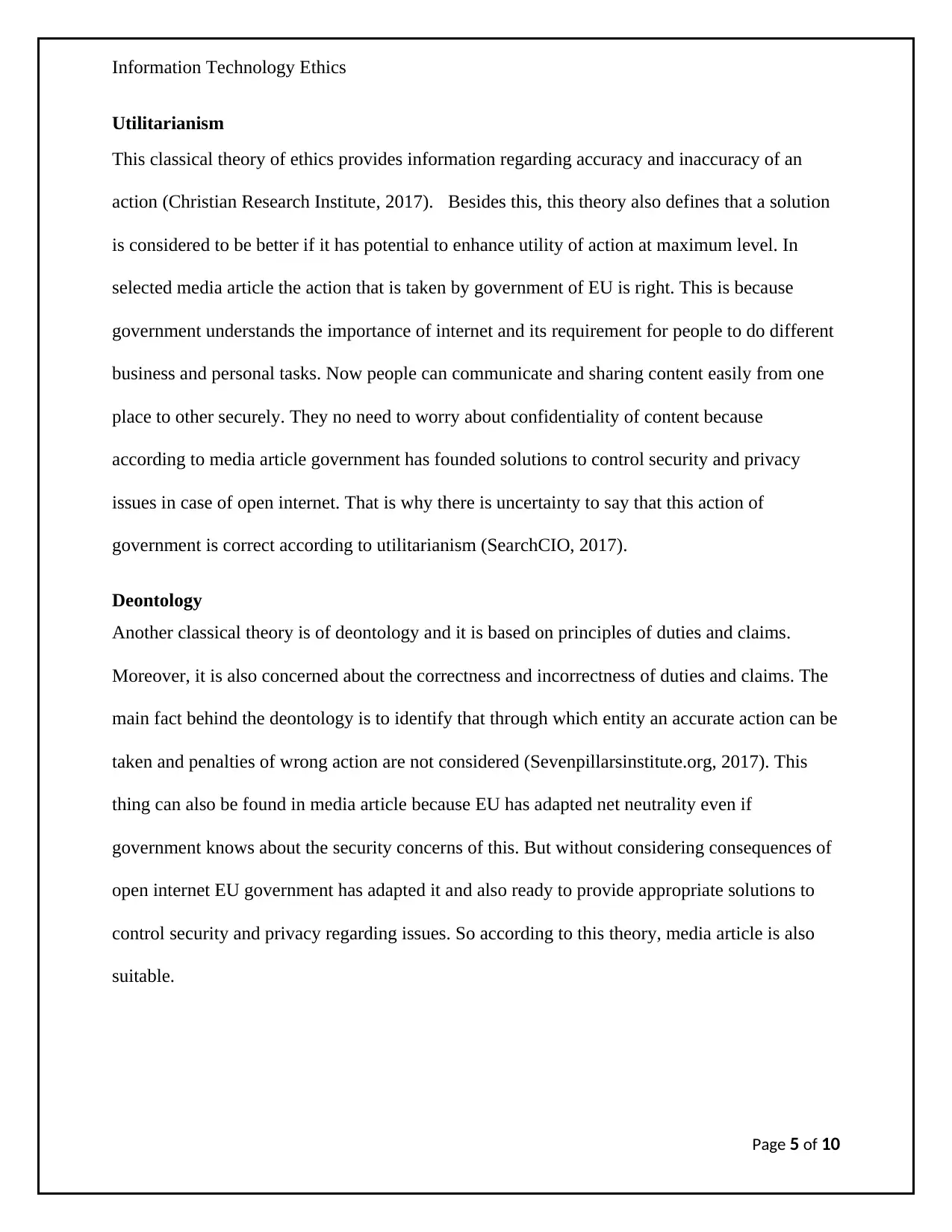
Information Technology Ethics
Utilitarianism
This classical theory of ethics provides information regarding accuracy and inaccuracy of an
action (Christian Research Institute, 2017). Besides this, this theory also defines that a solution
is considered to be better if it has potential to enhance utility of action at maximum level. In
selected media article the action that is taken by government of EU is right. This is because
government understands the importance of internet and its requirement for people to do different
business and personal tasks. Now people can communicate and sharing content easily from one
place to other securely. They no need to worry about confidentiality of content because
according to media article government has founded solutions to control security and privacy
issues in case of open internet. That is why there is uncertainty to say that this action of
government is correct according to utilitarianism (SearchCIO, 2017).
Deontology
Another classical theory is of deontology and it is based on principles of duties and claims.
Moreover, it is also concerned about the correctness and incorrectness of duties and claims. The
main fact behind the deontology is to identify that through which entity an accurate action can be
taken and penalties of wrong action are not considered (Sevenpillarsinstitute.org, 2017). This
thing can also be found in media article because EU has adapted net neutrality even if
government knows about the security concerns of this. But without considering consequences of
open internet EU government has adapted it and also ready to provide appropriate solutions to
control security and privacy regarding issues. So according to this theory, media article is also
suitable.
Page 5 of 10
Utilitarianism
This classical theory of ethics provides information regarding accuracy and inaccuracy of an
action (Christian Research Institute, 2017). Besides this, this theory also defines that a solution
is considered to be better if it has potential to enhance utility of action at maximum level. In
selected media article the action that is taken by government of EU is right. This is because
government understands the importance of internet and its requirement for people to do different
business and personal tasks. Now people can communicate and sharing content easily from one
place to other securely. They no need to worry about confidentiality of content because
according to media article government has founded solutions to control security and privacy
issues in case of open internet. That is why there is uncertainty to say that this action of
government is correct according to utilitarianism (SearchCIO, 2017).
Deontology
Another classical theory is of deontology and it is based on principles of duties and claims.
Moreover, it is also concerned about the correctness and incorrectness of duties and claims. The
main fact behind the deontology is to identify that through which entity an accurate action can be
taken and penalties of wrong action are not considered (Sevenpillarsinstitute.org, 2017). This
thing can also be found in media article because EU has adapted net neutrality even if
government knows about the security concerns of this. But without considering consequences of
open internet EU government has adapted it and also ready to provide appropriate solutions to
control security and privacy regarding issues. So according to this theory, media article is also
suitable.
Page 5 of 10
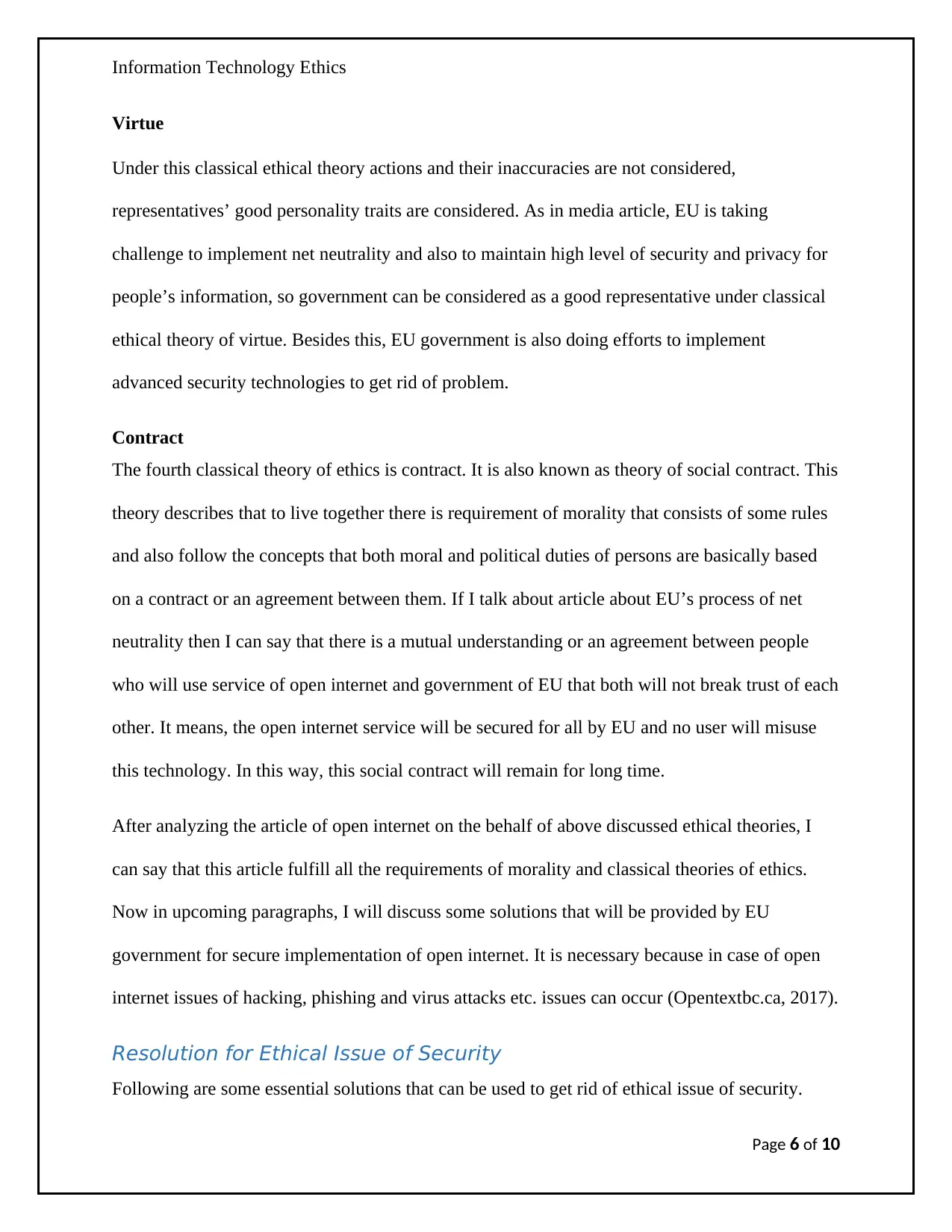
Information Technology Ethics
Virtue
Under this classical ethical theory actions and their inaccuracies are not considered,
representatives’ good personality traits are considered. As in media article, EU is taking
challenge to implement net neutrality and also to maintain high level of security and privacy for
people’s information, so government can be considered as a good representative under classical
ethical theory of virtue. Besides this, EU government is also doing efforts to implement
advanced security technologies to get rid of problem.
Contract
The fourth classical theory of ethics is contract. It is also known as theory of social contract. This
theory describes that to live together there is requirement of morality that consists of some rules
and also follow the concepts that both moral and political duties of persons are basically based
on a contract or an agreement between them. If I talk about article about EU’s process of net
neutrality then I can say that there is a mutual understanding or an agreement between people
who will use service of open internet and government of EU that both will not break trust of each
other. It means, the open internet service will be secured for all by EU and no user will misuse
this technology. In this way, this social contract will remain for long time.
After analyzing the article of open internet on the behalf of above discussed ethical theories, I
can say that this article fulfill all the requirements of morality and classical theories of ethics.
Now in upcoming paragraphs, I will discuss some solutions that will be provided by EU
government for secure implementation of open internet. It is necessary because in case of open
internet issues of hacking, phishing and virus attacks etc. issues can occur (Opentextbc.ca, 2017).
Resolution for Ethical Issue of Security
Following are some essential solutions that can be used to get rid of ethical issue of security.
Page 6 of 10
Virtue
Under this classical ethical theory actions and their inaccuracies are not considered,
representatives’ good personality traits are considered. As in media article, EU is taking
challenge to implement net neutrality and also to maintain high level of security and privacy for
people’s information, so government can be considered as a good representative under classical
ethical theory of virtue. Besides this, EU government is also doing efforts to implement
advanced security technologies to get rid of problem.
Contract
The fourth classical theory of ethics is contract. It is also known as theory of social contract. This
theory describes that to live together there is requirement of morality that consists of some rules
and also follow the concepts that both moral and political duties of persons are basically based
on a contract or an agreement between them. If I talk about article about EU’s process of net
neutrality then I can say that there is a mutual understanding or an agreement between people
who will use service of open internet and government of EU that both will not break trust of each
other. It means, the open internet service will be secured for all by EU and no user will misuse
this technology. In this way, this social contract will remain for long time.
After analyzing the article of open internet on the behalf of above discussed ethical theories, I
can say that this article fulfill all the requirements of morality and classical theories of ethics.
Now in upcoming paragraphs, I will discuss some solutions that will be provided by EU
government for secure implementation of open internet. It is necessary because in case of open
internet issues of hacking, phishing and virus attacks etc. issues can occur (Opentextbc.ca, 2017).
Resolution for Ethical Issue of Security
Following are some essential solutions that can be used to get rid of ethical issue of security.
Page 6 of 10
⊘ This is a preview!⊘
Do you want full access?
Subscribe today to unlock all pages.

Trusted by 1+ million students worldwide
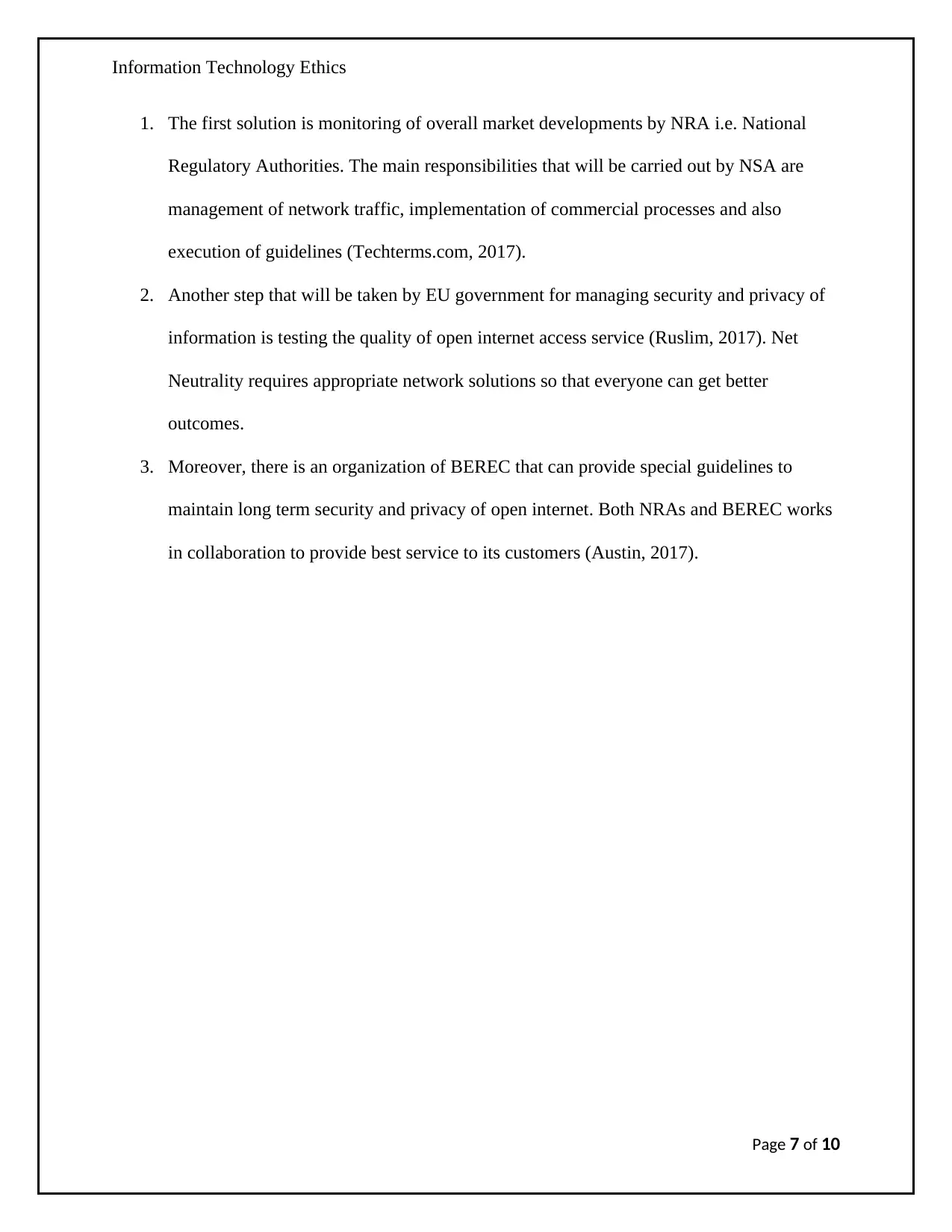
Information Technology Ethics
1. The first solution is monitoring of overall market developments by NRA i.e. National
Regulatory Authorities. The main responsibilities that will be carried out by NSA are
management of network traffic, implementation of commercial processes and also
execution of guidelines (Techterms.com, 2017).
2. Another step that will be taken by EU government for managing security and privacy of
information is testing the quality of open internet access service (Ruslim, 2017). Net
Neutrality requires appropriate network solutions so that everyone can get better
outcomes.
3. Moreover, there is an organization of BEREC that can provide special guidelines to
maintain long term security and privacy of open internet. Both NRAs and BEREC works
in collaboration to provide best service to its customers (Austin, 2017).
Page 7 of 10
1. The first solution is monitoring of overall market developments by NRA i.e. National
Regulatory Authorities. The main responsibilities that will be carried out by NSA are
management of network traffic, implementation of commercial processes and also
execution of guidelines (Techterms.com, 2017).
2. Another step that will be taken by EU government for managing security and privacy of
information is testing the quality of open internet access service (Ruslim, 2017). Net
Neutrality requires appropriate network solutions so that everyone can get better
outcomes.
3. Moreover, there is an organization of BEREC that can provide special guidelines to
maintain long term security and privacy of open internet. Both NRAs and BEREC works
in collaboration to provide best service to its customers (Austin, 2017).
Page 7 of 10
Paraphrase This Document
Need a fresh take? Get an instant paraphrase of this document with our AI Paraphraser
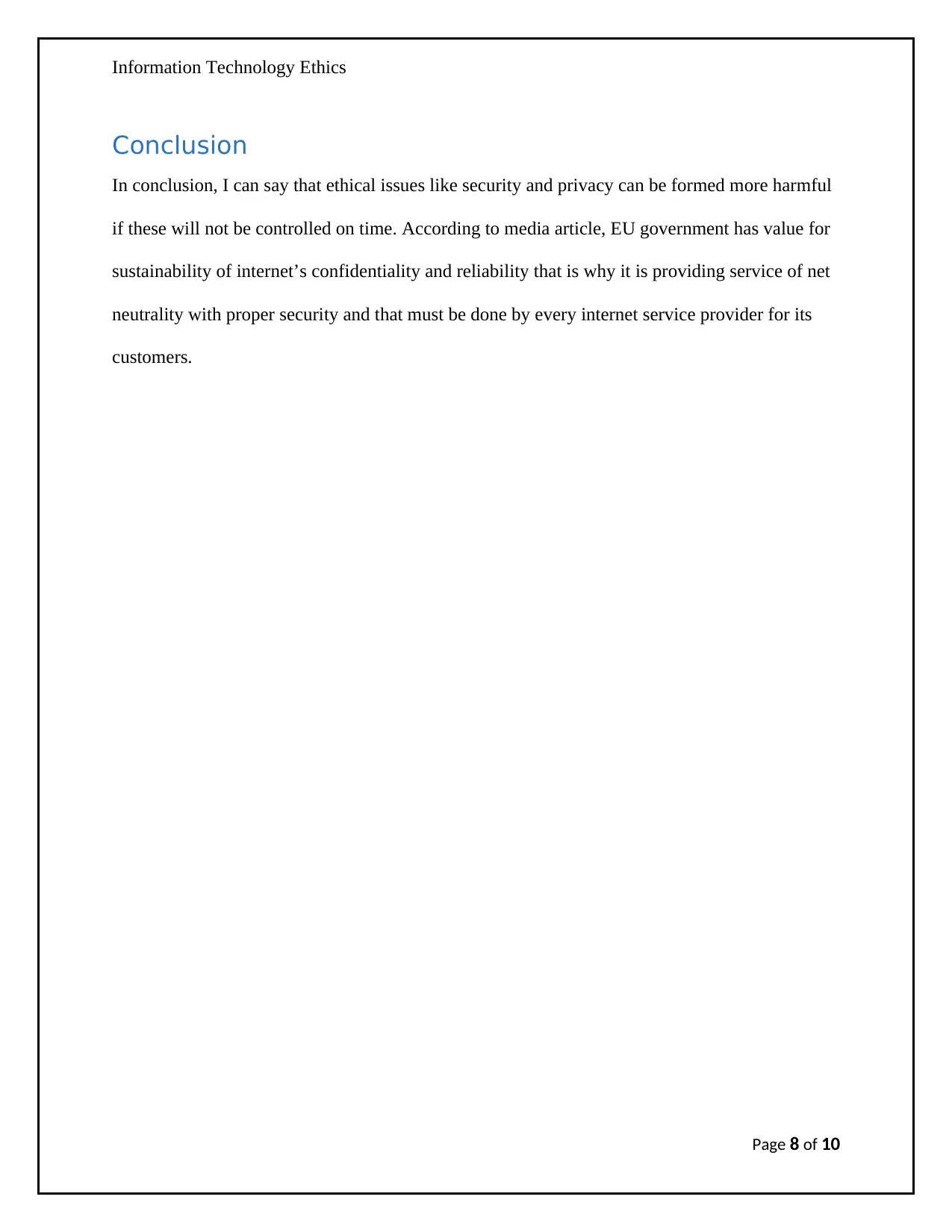
Information Technology Ethics
Conclusion
In conclusion, I can say that ethical issues like security and privacy can be formed more harmful
if these will not be controlled on time. According to media article, EU government has value for
sustainability of internet’s confidentiality and reliability that is why it is providing service of net
neutrality with proper security and that must be done by every internet service provider for its
customers.
Page 8 of 10
Conclusion
In conclusion, I can say that ethical issues like security and privacy can be formed more harmful
if these will not be controlled on time. According to media article, EU government has value for
sustainability of internet’s confidentiality and reliability that is why it is providing service of net
neutrality with proper security and that must be done by every internet service provider for its
customers.
Page 8 of 10
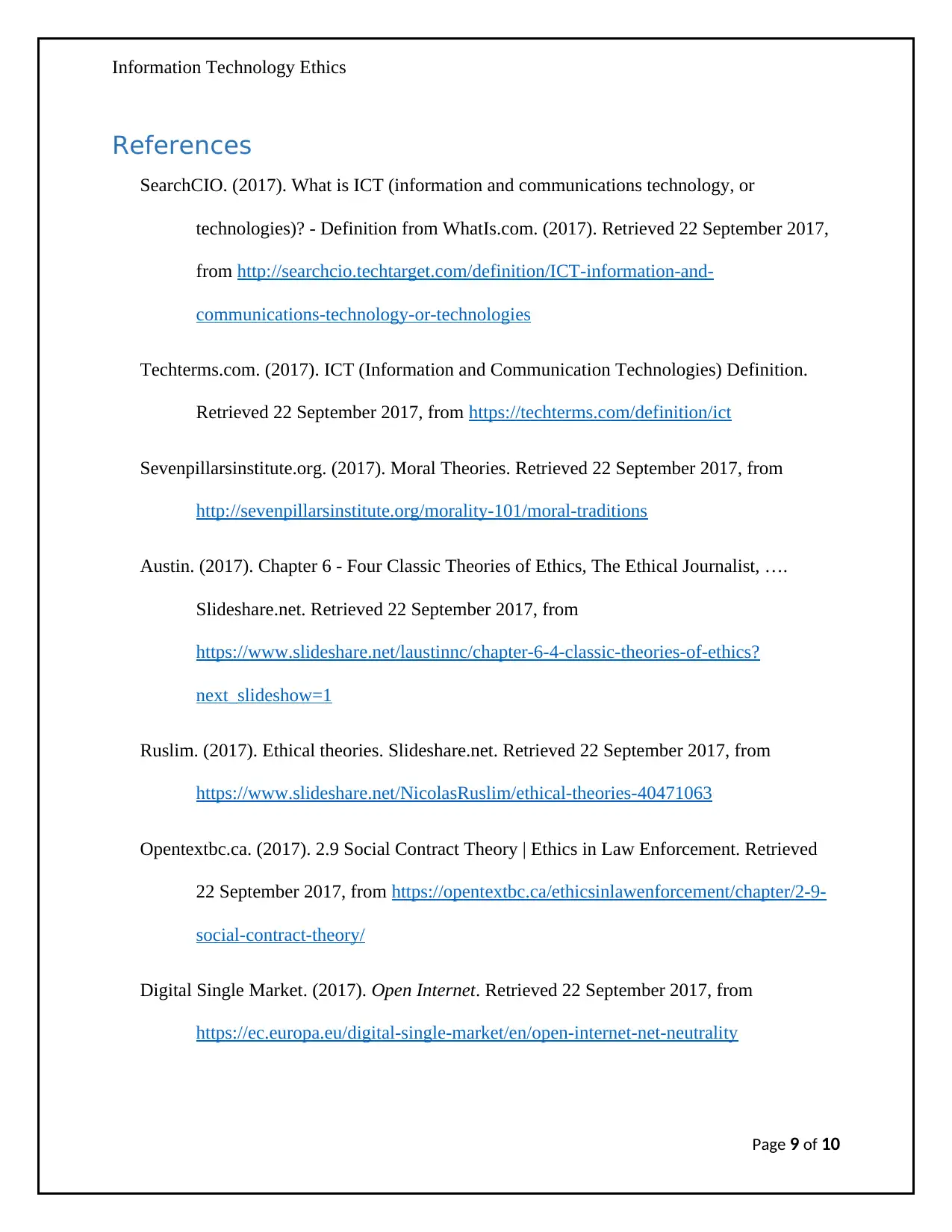
Information Technology Ethics
References
SearchCIO. (2017). What is ICT (information and communications technology, or
technologies)? - Definition from WhatIs.com. (2017). Retrieved 22 September 2017,
from http://searchcio.techtarget.com/definition/ICT-information-and-
communications-technology-or-technologies
Techterms.com. (2017). ICT (Information and Communication Technologies) Definition.
Retrieved 22 September 2017, from https://techterms.com/definition/ict
Sevenpillarsinstitute.org. (2017). Moral Theories. Retrieved 22 September 2017, from
http://sevenpillarsinstitute.org/morality-101/moral-traditions
Austin. (2017). Chapter 6 - Four Classic Theories of Ethics, The Ethical Journalist, ….
Slideshare.net. Retrieved 22 September 2017, from
https://www.slideshare.net/laustinnc/chapter-6-4-classic-theories-of-ethics?
next_slideshow=1
Ruslim. (2017). Ethical theories. Slideshare.net. Retrieved 22 September 2017, from
https://www.slideshare.net/NicolasRuslim/ethical-theories-40471063
Opentextbc.ca. (2017). 2.9 Social Contract Theory | Ethics in Law Enforcement. Retrieved
22 September 2017, from https://opentextbc.ca/ethicsinlawenforcement/chapter/2-9-
social-contract-theory/
Digital Single Market. (2017). Open Internet. Retrieved 22 September 2017, from
https://ec.europa.eu/digital-single-market/en/open-internet-net-neutrality
Page 9 of 10
References
SearchCIO. (2017). What is ICT (information and communications technology, or
technologies)? - Definition from WhatIs.com. (2017). Retrieved 22 September 2017,
from http://searchcio.techtarget.com/definition/ICT-information-and-
communications-technology-or-technologies
Techterms.com. (2017). ICT (Information and Communication Technologies) Definition.
Retrieved 22 September 2017, from https://techterms.com/definition/ict
Sevenpillarsinstitute.org. (2017). Moral Theories. Retrieved 22 September 2017, from
http://sevenpillarsinstitute.org/morality-101/moral-traditions
Austin. (2017). Chapter 6 - Four Classic Theories of Ethics, The Ethical Journalist, ….
Slideshare.net. Retrieved 22 September 2017, from
https://www.slideshare.net/laustinnc/chapter-6-4-classic-theories-of-ethics?
next_slideshow=1
Ruslim. (2017). Ethical theories. Slideshare.net. Retrieved 22 September 2017, from
https://www.slideshare.net/NicolasRuslim/ethical-theories-40471063
Opentextbc.ca. (2017). 2.9 Social Contract Theory | Ethics in Law Enforcement. Retrieved
22 September 2017, from https://opentextbc.ca/ethicsinlawenforcement/chapter/2-9-
social-contract-theory/
Digital Single Market. (2017). Open Internet. Retrieved 22 September 2017, from
https://ec.europa.eu/digital-single-market/en/open-internet-net-neutrality
Page 9 of 10
⊘ This is a preview!⊘
Do you want full access?
Subscribe today to unlock all pages.

Trusted by 1+ million students worldwide
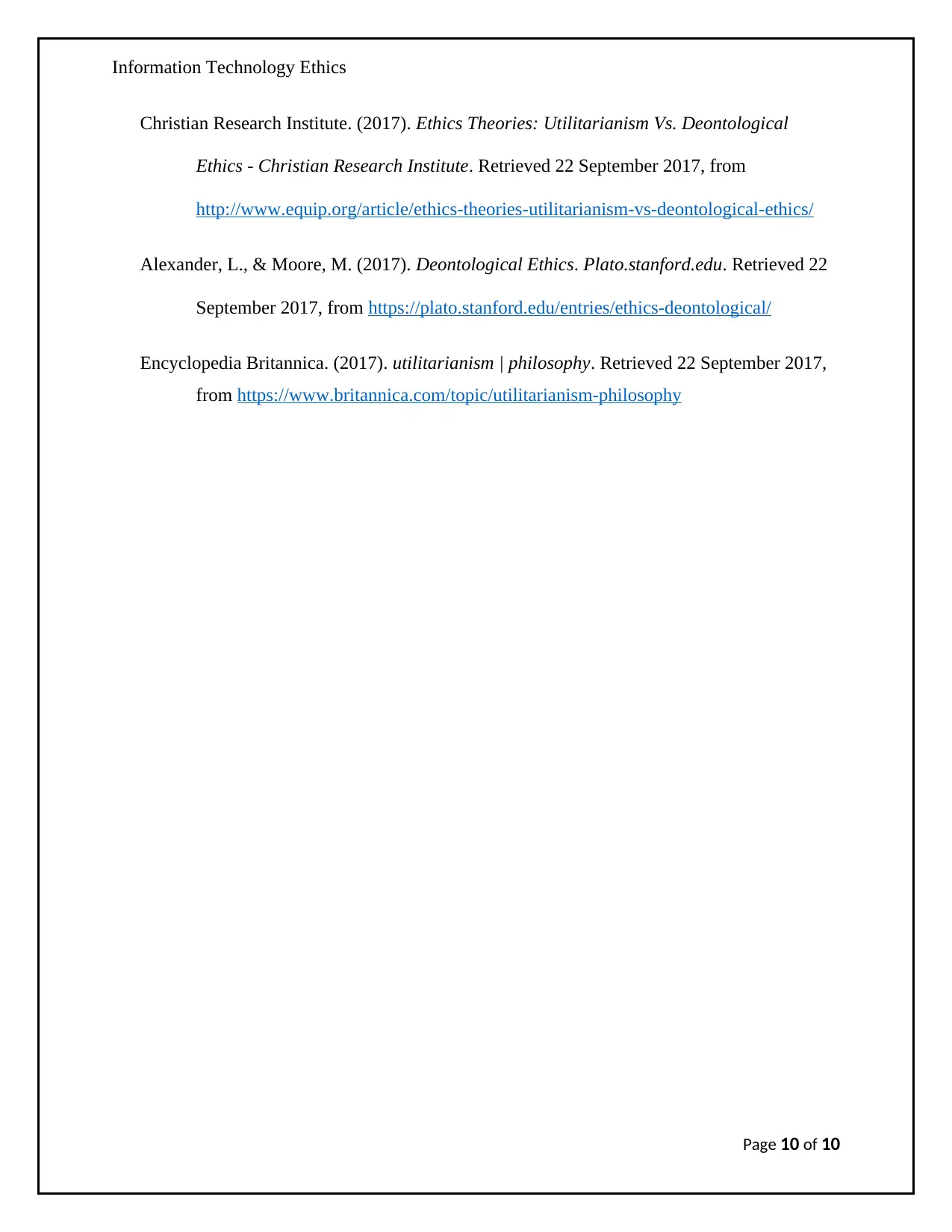
Information Technology Ethics
Christian Research Institute. (2017). Ethics Theories: Utilitarianism Vs. Deontological
Ethics - Christian Research Institute. Retrieved 22 September 2017, from
http://www.equip.org/article/ethics-theories-utilitarianism-vs-deontological-ethics/
Alexander, L., & Moore, M. (2017). Deontological Ethics. Plato.stanford.edu. Retrieved 22
September 2017, from https://plato.stanford.edu/entries/ethics-deontological/
Encyclopedia Britannica. (2017). utilitarianism | philosophy. Retrieved 22 September 2017,
from https://www.britannica.com/topic/utilitarianism-philosophy
Page 10 of 10
Christian Research Institute. (2017). Ethics Theories: Utilitarianism Vs. Deontological
Ethics - Christian Research Institute. Retrieved 22 September 2017, from
http://www.equip.org/article/ethics-theories-utilitarianism-vs-deontological-ethics/
Alexander, L., & Moore, M. (2017). Deontological Ethics. Plato.stanford.edu. Retrieved 22
September 2017, from https://plato.stanford.edu/entries/ethics-deontological/
Encyclopedia Britannica. (2017). utilitarianism | philosophy. Retrieved 22 September 2017,
from https://www.britannica.com/topic/utilitarianism-philosophy
Page 10 of 10
1 out of 10
Related Documents
Your All-in-One AI-Powered Toolkit for Academic Success.
+13062052269
info@desklib.com
Available 24*7 on WhatsApp / Email
![[object Object]](/_next/static/media/star-bottom.7253800d.svg)
Unlock your academic potential
Copyright © 2020–2026 A2Z Services. All Rights Reserved. Developed and managed by ZUCOL.





